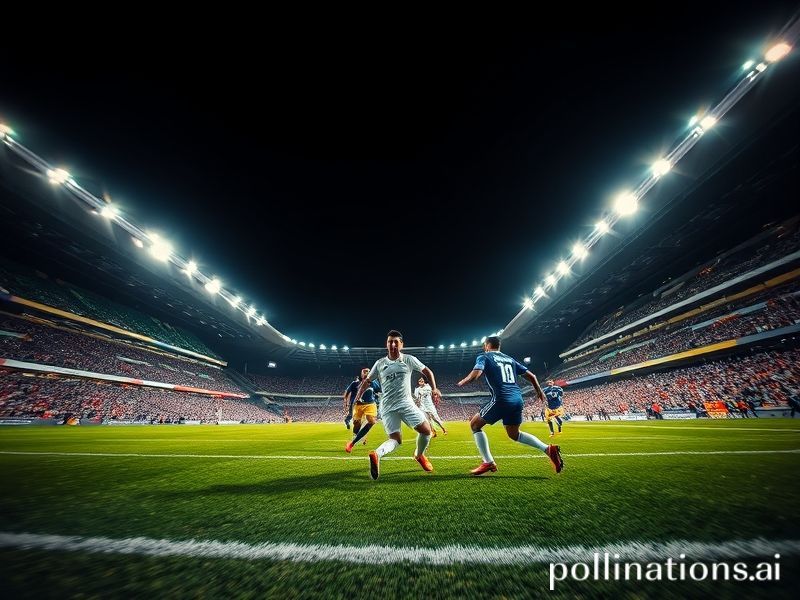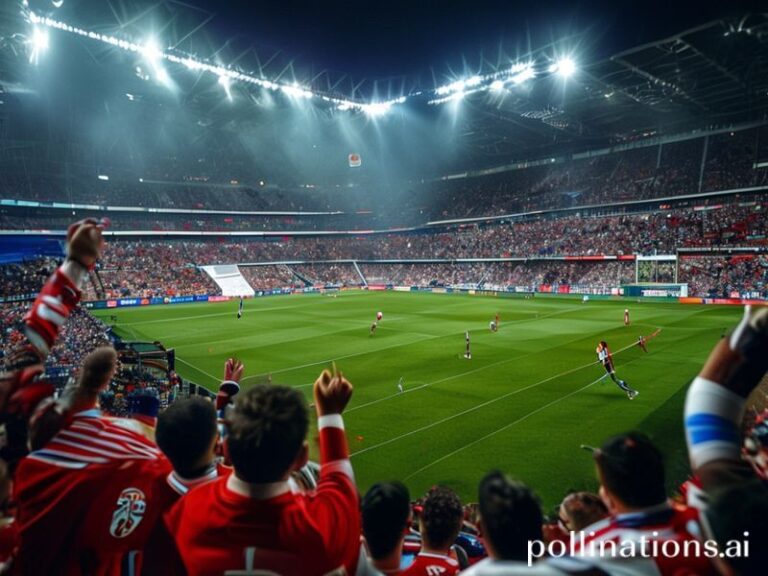Al-Ahli vs Al-Hilal: When a Saudi Derby Becomes a Global Satire of Oil, Egos and Excel Sheets
Riyadh, Saudi Arabia – If you listen closely during the 93rd minute of Al-Ahli Saudi vs Al-Hilal, you can almost hear the global order creak: petrodollars shifting in numbered Geneva accounts, streaming executives frantically refreshing spreadsheets, and a lone PIF accountant sighing at the carbon-footprint column marked “private jets, match-day.” This is no ordinary derby; it is a 90-minute morality play sponsored by Vision 2030, broadcast in 4K to debt-strapped Europe and binge-watched by Chinese ultra-fans who pronounce “Riyadh” with the confidence of a man ordering dim sum in fluent Cantonese.
On paper it’s simple: Al-Hilal, the blue-clad galacticos who recently convinced Neymar that ACL rehab is best done on a yacht in the Red Sea, versus Al-Ahli, the newly promoted arrivistes who lunched with Roberto Firmino over halal wagyu and asked whether he still remembered how to press. Yet in the macro-view, the fixture is Saudi Arabia’s latest soft-power PowerPoint slide—transitioning briskly from “ancient heritage” to “we bought your childhood heroes, deal with it.”
Global implications? Start with Europe, where La Liga’s middle class now treat every Saudi transfer rumor like an incoming asteroid. Barcelona, still leveraged to the Camp Nou rafters, watch the chequebook across the Gulf the way a medieval peasant watched the Mongol horde: equal parts terror and envy. Meanwhile in Washington, think-tankers append footnotes titled “Saudi Sportswashing & You,” right between “Ukraine Aid Package” and “Why Congress Still Can’t Pass a Budget.” Pentagon analysts, ever literal-minded, brief generals on the strategic value of Cristiano Ronaldo’s vertical leap. (It is, apparently, “non-kinetic deterrence.”)
Asia sees it differently. In Jakarta’s cafés, fans debate whether Al-Hilal’s Asian Champions League seeding is proof the House of Saud now outranks the House of Mouse for sheer entertainment ROI. Tokyo’s late-night hosts run comedy sketches: a Saudi sheikh, a Japanese tech mogul, and a Korean pop idol walk into a bidding war—only the punchline is that the idol ends up owning the broadcasting rights. Even Tehran’s state TV, never one to miss a chance at moral outrage, frames the match as “decadent Gulf monarchs kicking spheres while Yemen starves,” then cuts to commercials selling Turkish washing machines.
Back on the pitch, the tactical subplot drips with irony. Al-Hilal’s Portuguese coach Jorge Jesus—once the darling of Flamengo’s favelas—now lectures millionaires on defensive transition under the same desert sun that allegedly invented algebra. Across the technical area, Matthias Jaissle, the German wunderkind who took Red Bull Salzburg from Mozart to Gegenpress, tries to teach high-line football to players who grew up on FIFA speed-boost glitches. Somewhere, Pep Guardiola strokes a bald spot that suddenly feels less special.
Commercially, the game is a stress test for the new global fan: the algorithmic spectator who wakes in Lagos, doom-scrolls in London, and streams in São Paulo. Will he notice that the stands are 30-percent populated by Western consultants on six-figure retainers, frantically WhatsApp-ing head-office about “authentic fan engagement”? Will the NFT of Salem Al-Dawsari’s left foot still be worth 0.03 Ethereum when the final whistle blows? (Spoiler: it will crash faster than the Turkish lira, but the consultant will still invoice for “post-match sentiment analysis.”)
And yet, amid the cynicism, there is something almost quaint. In a world where every news cycle ends with a mushroom-cloud GIF, 22 men chasing leather under floodlights feels comfortingly obsolete—like fax machines, or the United Nations. For 90 minutes, geopolitics shrinks to the size of a penalty box. The crowd, a curated mix of locals and expats who smell of Oud and expensed cologne, forgets about oil futures and remembers the primal joy of calling the referee a visually impaired camel.
When the final whistle arrives—usually after six minutes of stoppage time, the exact length of a TikTok attention span—the scoreboard will declare either Blue or Yellow the victor. But the real winners are the accountants already booking next quarter’s “football asset amortization.” And the losers? Anyone still romantic enough to believe the game is about glory, not Excel.







